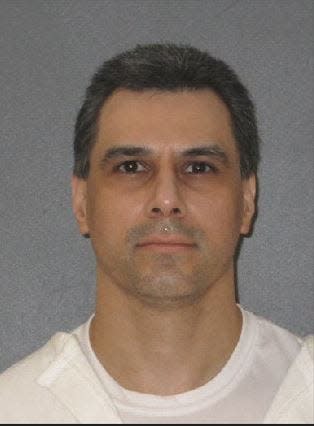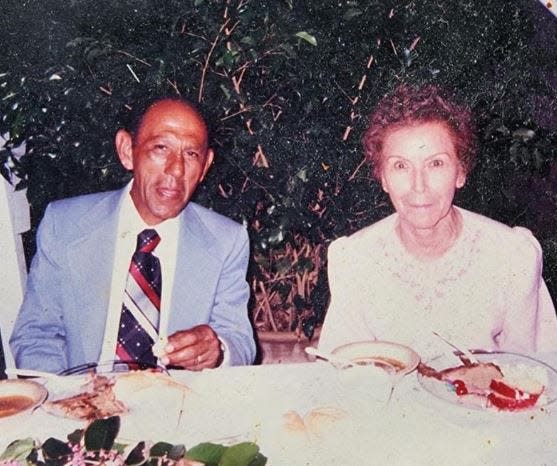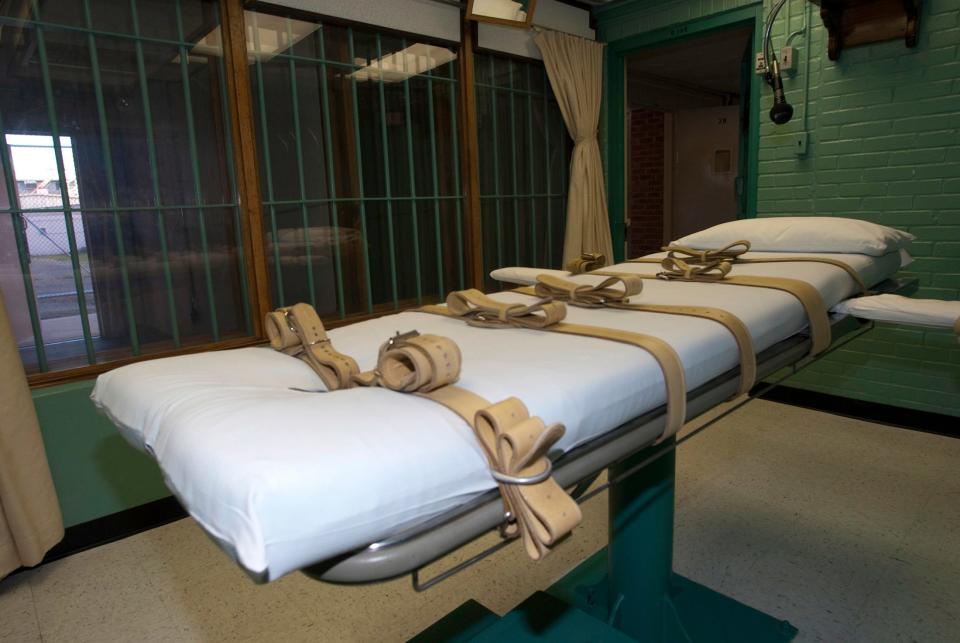Who is Ruben Gutierrez? The Texas man is set for execution in retired schoolteacher's murder
A Texas man convicted in the beating death of an elderly retired schoolteacher in her own home says he didn't take part in her murder and that DNA testing would prove his innocence.
Ruben Gutierrez, 47, is set to be executed Tuesday at a state prison in Huntsville, about 70 miles north of Houston. That would make him the third inmate put to death in the state this year and the 10th in the nation.
Gutierrez was convicted in the 1998 beating death of 85-year-old Escolastica Harrison, who was targeted because she had over $600,000 in cash in her home in the south Texas border city of Brownsville, according to court records.
As Gutierrez nears his execution by lethal injection, USA TODAY is looking closer at the crime he was convicted of, why he argues he shouldn't be put to death and who he was before that terrible night in 1998.

Who is Ruben Gutierrez?
At the time of the crime, Gutierrez was a 21-year-old married father of two kids who had been working as a security guard at a resort on South Padre Island. He had married at the age of 17 when his then-girlfriend became pregnant.
A native of Fort Myers, Florida, his parents moved him and his older brother to Brownsville when Gutierrez was about 8 years old, according to Diane Mosnik, a clinical neuropsychologist who evaluated Gutierrez in 2019.
The Gutierrez brothers grew up in a low-income house with an alcohol father who frequently beat both his sons and his wife, who at one point was hospitalized after a nervous breakdown, Mosnik wrote in her report.
His parents eventually separated but Gutierrez’s father frequently showed up, once “holding his mother by her neck over the side of the sink with a knife at her neck, threatening to kill her right there,” Mosnik wrote.
As a young adult, Gutierrez struggled with behavioral problems in school and with drug use, first trying cocaine at age 13 and eventually progressing to using it on a “near daily basis” up until his arrest, she wrote.
Mosnik diagnosed Gutierrez with post-traumatic stress disorder.
“That exposure to such intense and violent trauma to loved family members at such a young age is known to result in significant psychological and behavioral disturbance, as evidenced by Mr. Gutierrez throughout his life,” she wrote. “The exposure and psychological consequences of the traumatic exposure has been the cause of significant distress and impairment in his level of functioning across important aspects of his life and led him to his current situation.”
More about what Ruben Gutierrez was convicted of
The victim, Harrison, had been living with her nephew, Avel Cuellar, in 1998. Gutierrez was a friend of Cuellar's and was frequently at Harrison's home socializing and drinking with friends, and befriended the 85-year-old and ran errands for her, eventually learning about the cash she kept in her home and crafting a plan to steal it, according to court records.
On Sept. 5, 1998, Gutierrez and two other men ? Rene and Pedro Garcia ? went to Harrison's home to rob her. The accounts of what happened in her home vary, with Gutierrez arguing that he waited outside and had no idea things would get violent.
Regardless, Harrison ended up “face down in a pool of blood” after having been beaten and stabbed, court records say. Though Gutierrez thought Harrison had $600,000 in the home, the men made away with at least $56,000.
A jury found Gutierrez guilty of capital murder in 1999 and sentenced him to death one month later. His execution has previously been set six times and then postponed over mostly clerical errors ? a process that amounts to torture, his attorney argues in a petition for clemency that the Texas Board of Pardons and Paroles denied on Friday.

What has Gutierrez argued in his appeals?
Arguing that he didn't participate in Harrison's murder, Gutierrez has said that DNA testing on items collected from the crime scene can prove as much. They include fingernail scrapings, hair, clothing and blood samples.
Gutierrez also argues that a number of other issues make his death penalty unjust, including a lack of evidence, undisclosed evidence by prosecutors, jury misconduct, attorney failure, and coerced confessions, among others according to court documents.
On top of that, authorities failed to properly investigating a “main alternative suspect,” who knew the victim personally, had just as much access to Harrison, and provided inconsistent statements to authorities, Gutierrez argues.
Cameron County District Attorney Luis Saenz refutes Gutierrez's claims, telling USA TODAY last week that his efforts are merely a “delay tactic.”
"Justice delayed is justice denied," he said. "I think the public is just frustrated with how long it takes for justice to be served. For Mrs. Harrison and for any victim in these situations."
In court records, his office has argued that Gutierrez's arguments about DNA testing amounted to an "abusive delay."
“Gutierrez purposefully forewent DNA testing at his trial in 1999, and he has leveraged that strategic decision for the last 20 years to delay enforcement of his sentence," prosecutors wrote this month.
In his ultimately failed clemency petition, Gutierrez argued that jurors never heard about his traumatizing background, and one of his jurors now doesn't want him executed and another juror thinks the DNA testing should be performed.
Gutierrez currently has a petition pending before the U.S. Supreme Court, which is expected to rule on the matter sometime between now and the start of Gutierrez’s execution.
Only a Supreme Court ruling or a pardon from Republican Texas Gov. Greg Abbott could stop the execution.
Abbott, who has referred to the death penalty as "Texas justice,” has overseen the execution of 74 inmates since he took office in 2015 and granted clemency in one case.

When will Ruben Gutierrez be executed?
Gutierrez is set to be executed by lethal injection on Tuesday, July 16 anytime after 6 p.m. CT.
It is the most common execution method in the country, with jurisdictions employing one, two, or as many as three drugs to put an inmate to death.
Gutierrez will choose a meal from a menu available to all inmates in the Huntsville Unit since Texas no longer accommodates last meal requests from condemned inmates, Texas Department of Criminal Justice spokesperson Hannah Haney previously told USA TODAY.
One of Harrison’s nephews, Alex Hernandez, plans to witness the moment Gutierrez is put to death to fulfill a promise he made on his mother’s deathbed.
This article originally appeared on USA TODAY: Texas man set for execution in schoolteacher's murder claims innocence
